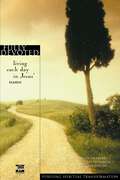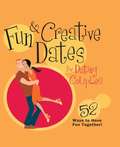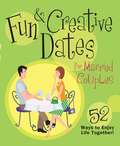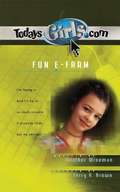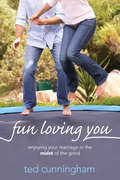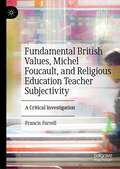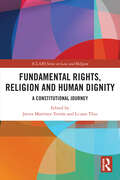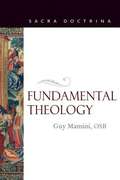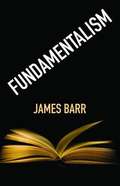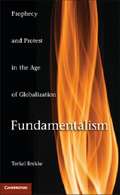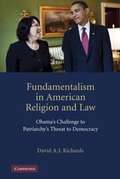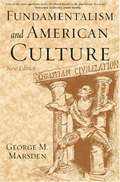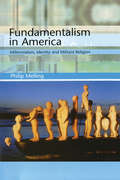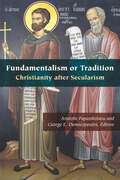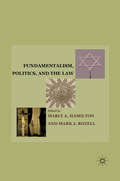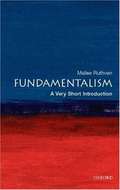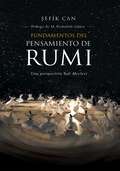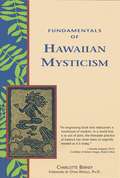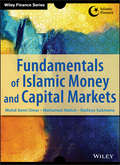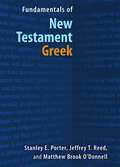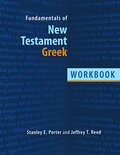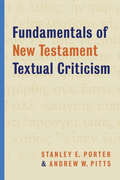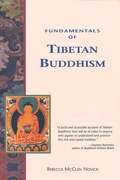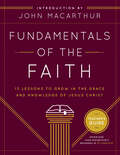- Table View
- List View
Fully Devoted: Living Each Day in Jesus' Name (Pursuing Spiritual Transformation)
by John Ortberg Laurie Pederson Judson PolingWhat does it mean to do everything "in Jesus’ name"? Is that an ideal attainable only by a few "super Christians"--or is it a way of life we can all experience?Leader’s guide included!Fully Devoted group sessions are:What Is True Spirituality?GraceGrowthGroupsGiftsGiving"We Know Him Well . . . "
Fun & Creative Dates for Dating Couples
by Howard BooksFun Dates... Just for You! Who says dates have to be boring and unexciting? In Fun & Creative Dates for Dating Couples -- 52 Ways to Have Fun Together, you'll find ideas for all kinds of dates to celebrate your relationship with that special someone -- romantic dates, inspiring dates, even dates that challenge you! From rock climbing and hot air ballooning to playing in the rain or volunteering for a worthy cause, you'll have a hard time choosing which one to do first. So get ready to have a blast as you spend time having fun and getting to know each other better! You might even find that you have so much in common you want to do this...forever!
Fun & Creative Dates for Married Couples
by Howard BooksBring Back the Magic! Tired of doing the same old thing when it comes to your date night? Would you like to be inspired to get out of your rut and try something new? Then Fun & Creative Dates for Married Couples -- 52 Ways to Enjoy Life Together is the book for you! Inside you will find ideas for dates that will add a little fun and romance to your marriage. From bungee jumping or taking a romantic carriage ride to backyard camping or volunteering for a worthy cause, you'll find dates for all occasions and all budgets. Who says dates have to be boring? Add some spice to them with these fun and creative dates...just for you!
Fun E-farm (TodaysGirls.com #12)
by Terry Brown Heather Wiseman"After rescuing a litter of abandoned kittens from a dumpster, Morgan finds herself setting up an emergency animal shelter in her family's barn, without her parents' knowledge."
Fun Loving You
by Ted CunninghamFor a Good Time, Call Home Ted Cunningham has a surprising definition of marriage: a man and a woman enjoying life together. In fact, God created marriage to be a blast--even when it feels like the rest of life is going to explode. This refreshing book will help you: Laugh together again (it's easier than you think)Make sex even more exciting than on your honeymoonDiscover how to make doing dishes together a partyFight as teammates, not opponentsFigure out how to break the routine without breaking the bankRemember why your spouse is the most likeable person you know Fun Loving You puts laughter, fun, and even spin-the-bottle back into marriage. After all, life is hard. Marriage doesn't have to be.
Fundamental British Values, Michel Foucault, and Religious Education Teacher Subjectivity: A Critical Investigation
by Francis FarrellThis book contributes to the small but growing critical literature on fundamental British values and the Prevent strategy in the British education system. Focusing specifically on RE, a subject concerned with multiculturalism, difference and pluralism, the book will argue that there is a tension between the aims of RE and the agenda of fundamental British values. The author argues that fundamental British values and the requirements of the Prevent duty (2015) amount to a securitization of education which fundamentally alters the relationship between teachers and learners. The book presents these developments in education policy as a radical discursive shift: drawing from in depth individual and group interviews with 52 secondary teachers of religious education, the book foregrounds the views of BAME teachers and argues for a nuanced and inclusive approach to civic and values education.
Fundamental Rights, Religion and Human Dignity: A Constitutional Journey (ICLARS Series on Law and Religion)
by Javier Martínez-Torrón and Li-ann ThioThis collection examines theoretical and practical issues concerning the relationship between freedom of religion or belief and other fundamental rights, in the context of secular States, from the perspective of human dignity.As the Universal Declaration of Human Rights made clear, human dignity constitutes the foundation of human rights, among which freedom of thought, conscience, and religion occupies a prominent place. As a consequence of the inter-cultural debate that is ongoing in contemporary Western societies, which are increasingly pluralistic, the concept of human dignity faces important challenges in terms of what it requires. The five chapters included in the first part of this book discuss some of these conceptual challenges, such as the implications of common good constitutionalism for the understanding of human dignity and the role of religious freedom from the perspective of Western experiences and legal thinkers. The chapters in Part II explore particular questions involving human dignity and the relationship between freedom of religion or belief and other human rights, for example, how to build bridges between religious freedom and other fundamental freedoms when people make conflicting legitimate choices. Taken together, the book offers an insightful range of perspectives on some contemporary challenges raised by the exercise of religious freedom in societies that claim to be based on respect for human dignity and human rights.The volume will be a valuable resource for academics, researchers, and policy-makers working in the areas of Law and Religion, Human Rights Law, Constitutional Law, and International Relations.
Fundamental Theology (Sacra Doctrina)
by Guy MansiniFundamental Theology examines the light by which the mysteries of Christ and the Church, the Trinity and the Sacraments, are revealed to us. That light we call "revelation," and fundamental theology examines in the first place what this light shows about itself, and how it is sustained in the world. Or again, fundamental theology considers what the word of God has to say both about itself and what it has to say about where in the world it is to be heard. So, first it is a theology of Revelation (chapter 1), and second, a theology of the transmission of Revelation in Tradition, Scripture, and the Church (chapters 2, 3, and 4). Why must Revelation have the shape it does, and why must it be constituted by both word and event? Why is Tradition prior to Scripture, why must the word of God be written down, and why must Scripture come to us in two testaments? And why must the message conveyed in Tradition and Scripture have a living interpreter in the Church? <p><p> Since no word is spoken unless it is heard, fundamental theology also investigates the conditions of hearing the word of God, the very hearing itself in the assent of faith, and a necessary consequence of this hearing. The remote conditions of hearing are also what theology calls our ability to come to the knowledge of the preambula fidei- the things about God than can be known by the natural light (chapter 5). The immediate condition of hearing is the credibility of the word (chapter 6). Hearing is faith (chapter 7). And true hearing gives the hearer to recapitulate what is heard in his own wondering and thankful voice in theology (chapter 8). The introduction to theology in the last chapter is by way of considering the history of Catholic theology in the 20th century.
Fundamentalism
by James BarrMuch of the Christianity which flourishes best today has “conservative” or “fundamentalist” characteristics, that is, strong emphasis on the correctness of the Bible, hostility to the methods of modern critical theology and an assurance that those who choose to differ are not really “true Christians” at all. In this penetrating critique Professor Barr first argues that the nature of fundamentalism is often misunderstood and that the general understanding of the way in which biblical conservatism works needs to be improved and corrected. Secondly, however, he seeks to dissuade those who are attracted by it, arguing that the conservative position is not only incoherent as a scholarly position but thoroughly in contradiction, theologically, with the central logic of Christian faith. Biblical scholarship and theology, he believes, have much to learn from the discussion. While it is right to repudiate a fundamentalist approach, the reasons advanced for this rejection have often been unsound, and these unsound arguments have damaged both modern biblical criticism and modern theology. Both conservative evangelical and more liberal scholars are likely to study what he has to say with unusual avidity.
Fundamentalism
by Torkel BrekkeThis book investigates the origins of fundamentalism, outlining its characteristics and the history of key fundamentalist movements around the world, considering examples from Christianity, Islam, Buddhism and Hinduism. The book argues that fundamentalism develops when modern lay religious leaders challenge the authority of secular states and traditional religious establishments. These new leaders and their followers seek to infuse religious values and practices into all spheres, especially law, politics, education and science. The patterns of religious authority and leadership that characterize fundamentalism have their roots in a Christian context but were globalized through intense intercultural contacts after the mid-nineteenth century. Fundamentalism is a thoroughly modern and global phenomenon because it presupposes the globalization of ideas and practices concerning religious leadership and organization, as well as universal changes in the relationship of religion to modern societies and states.
Fundamentalism In American Religion And Law
by David A. J. RichardsWhy, from Reagan to George Bush, have fundamentalists in religion and in law (originalists) exercised such political power and influence in the United States? Why has the Republican Party forged an ideology of judicial appointments (originalism) hostile to abortion and gay rights? Why and how did Barack Obama distinguish himself among Democratic candidates not only by his opposition to the Iraq war but by his opposition to originalism? This book argues that fundamentalism in both religion and law threatens democratic values and draws its appeal from a patriarchal psychology still alive in our personal and political lives and at threat from the constitutional developments since the 1960s. The argument analyzes this psychology (based on traumatic loss in intimate life) and resistance to it (based on the love of equals). Obama's resistance to originalism arises from his developmental history as a democratic, as opposed to patriarchal, man who resists the patriarchal demands on men and women that originalism enforces - in particular, the patriarchal love laws that tell people who and how and how much they may love.
Fundamentalism and American Culture (2nd edition)
by George M. MarsdenMany Americans today are taking note of the strong political force that is the religious right. Controversial decisions by the government are met with hundreds of lobbyists, millions of dollars of advertising spending, and a grassroots response.
Fundamentalism in America: Millennialism, Identity And Militant Religion (America In The 20th/21st Century Ser. #Vol. 8)
by Philip MellingFirst Published in 2000. Routledge is an imprint of Taylor & Francis, an informa company.
Fundamentalism or Tradition: Christianity after Secularism (Orthodox Christianity and Contemporary Thought)
by Aristotle Papanikolaou and George E. DemacopoulosTraditional, secular, and fundamentalist—all three categories are contested, yet in their contestation they shape our sensibilities and are mutually implicated, the one with the others. This interplay brings to the foreground more than ever the question of what it means to think and live as Tradition. The Orthodox theologians of the twentieth century, in particular, have emphasized Tradition not as a dead letter but as a living presence of the Holy Spirit. But how can we discern Tradition as living discernment from fundamentalism? What does it mean to live in Tradition when surrounded by something like the “secular”? These essays interrogate these mutual implications, beginning from the understanding that whatever secular or fundamentalist may mean, they are not Tradition, which is historical, particularistic, in motion, ambiguous and pluralistic, but simultaneously not relativistic.Contributors: R. Scott Appleby, Nikolaos Asproulis, Brandon Gallaher, Paul J. Griffiths, Vigen Guroian, Dellas Oliver Herbel, Edith M. Humphrey, Slavica Jakelić, Nadieszda Kizenko, Wendy Mayer, Brenna Moore, Graham Ward, Darlene Fozard Weaver
Fundamentalism, Politics, and the Law
by Marci A. Hamilton Mark J. RozellThis book studies the phenomenon of fundamentalism in the United States. It contains historical and contemporary scholarly analysis of the Christian movements that emerged around the time of the Moral Majority.
Fundamentalism: A Very Short Introduction
by Malise RuthvenFundamentalism is seen as the major threat to world peace today, a conclusion impossible to ignore since the events in New York on September 11, 2001. But what does "fundamentalism" really mean? Since it was coined by American Protestant evangelicals in the 1920s, the use of the term "fundamentalist" has expanded to include a diverse range of radical conservatives and ideological purists, not all religious. Fundamentalism could now mean both militant Israeli settlers as well as the Islamist radicals who oppose them, it can mean Christians, Hindus, animal liberationists, and even Buddhist nationalists. Here, Middle East expert Malise Ruthven investigates fundamentalism's historical, social, religious, political, and ideological roots, and tackles the polemic and stereotypes surrounding this complex phenomena--one that eludes simple definition, yet urgently needs to be understood.
Fundamentals Of Rumis Thought
by Sefik CanThis work attempts to present Rumi to the English-speaking world and to shed light on his life as seen from within the Islamic mystical tradition. The knowledge presented in this work comes from Sefik Can, a great expert of Rumi and who used to be the highest authority, Sertariq, of the Mevlevi Sufi order in Turkey until he passed away on January 24, 2005. Two aspects of this work make it unique. The first is that the book was originally authored by a man who is ninety five years old and who has dedicated his entire life to the teachings of Rumu. Such a Mevlevi's view of Rumi makes this work greatly valuable. The second important contribution to the book is the foreword, which was translated by from the original turkish, written by M. Fethullah Gulen, a prominent Muslim thinker and interfaith activist of Turkey.
Fundamentals of Hawaiian Mysticism
by Charlotte BerneyHuna is ancient and at the same time magnificently modern.The mystical practice of Kahuna evolved in isolation on the island paradise of Hawaii. The ancient Hawaiians valued words, prayer, their gods, the sacred, the breath, a loving spirit, family ties, the elements of nature, and mana-the vital life force-ideas profound yet elegantly simple. Discovering the concepts of Huna is like finding gemstones in a mountain-a joyous journey!From the Trade Paperback edition.
Fundamentals of Islamic Money and Capital Markets
by Azmi Omar Muhamad Abduh Raditya SukmanaThe first comprehensive guide to Islamic financial marketsBased on the course taught at the International Islamic University Malaysia, this is the first book on Islamic finance to focus exclusively on money and capital markets. Covering basic concepts as well as current practices in Islamic financial markets, the book features case studies from real markets. It outlines the theory of money in terms of value, supply, and demand, while explaining the Islamic capital markets in terms of classifications, types of operations, valuations of securities, Islamic unit trust, ETFs, Islamic stock broking, and much more.Written by experts from the International Islamic University Malaysia, the leading organisation in research in Islamic financeThe first guide to Islamic finance focused solely on money and capital marketsAn excellent introduction to money market principles for students in Islamic banking and finance, as well as researchers and current practitioners, Fundamentals of Islamic Money and Capital Markets is a vital resource on the subject.
Fundamentals of Literature for Christian Schools
by Donna L. Hess June CatesThis book interprets six topics in a biblical perspective: conflict, character, theme, structure, point of view and moral tone.
Fundamentals of New Testament Greek
by Stanley E. Porter Jeffrey T. Reed Matthew Brook O'DonnellThis extremely useful volume is a comprehensive introduction to the grammar and vocabulary of the Greek of the New Testament, with extensive paradigms, examples, and explanations. / Porter, Reed, and O’Donnell’s Fundamentals of New Testament Greek makes use of pedagogically sound and linguistically informed language-instruction techniques to provide the most effective textbook possible. The book introduces the individual elements of the Greek language according to their frequency of use in the New Testament so as to reinforce in students the elements that they will most often encounter. Every grammatical element is explained in sufficient detail — including illustrative examples — and is accompanied by useful information to describe its composition and analysis. The authors also include complete paradigms with plenty of examples, and significant vocabulary is introduced throughout the course of the volume. / Students who complete this text can engage in serious reading, translation, and understanding of the Greek New Testament, moving directly into Greek exegesis courses and more advanced Greek-language courses. Fundamentals of New Testament Greek: First Year will prove invaluable for gaining a thorough foundational understanding of New Testament Greek. It is bound to be a standard text for years to come.
Fundamentals of New Testament Greek: Workbook
by Stanley E. Porter Jeffrey T. ReedThis extremely useful volume is a comprehensive introduction to the grammar and vocabulary of the Greek of the New Testament, with extensive paradigms, examples, and explanations. / Porter, Reed, and O’Donnell’s Fundamentals of New Testament Greek makes use of pedagogically sound and linguistically informed language-instruction techniques to provide the most effective textbook possible. The book introduces the individual elements of the Greek language according to their frequency of use in the New Testament so as to reinforce in students the elements that they will most often encounter. Every grammatical element is explained in sufficient detail — including illustrative examples — and is accompanied by useful information to describe its composition and analysis. The authors also include complete paradigms with plenty of examples, and significant vocabulary is introduced throughout the course of the volume. / Students who complete this text can engage in serious reading, translation, and understanding of the Greek New Testament, moving directly into Greek exegesis courses and more advanced Greek-language courses. Fundamentals of New Testament Greek: First Year will prove invaluable for gaining a thorough foundational understanding of New Testament Greek. It is bound to be a standard text for years to come.
Fundamentals of New Testament Textual Criticism: Textual Criticism
by Stanley E. Porter Andrew W. PittsFills the need for a truly mid-level, quality textbook on New Testament textual criticism Presenting all the essential, foundational elements necessary to grasp textual criticism of the New Testament, Stanley Porter and Andrew Pitts accurately define the subject of textual criticism, discuss the canon and manuscripts of the New Testament, outline methodological principles, and more, concluding with a chapter on New Testament translations and how to evaluate them. Part of a coordinated Greek study curriculum, this volume is designed to function as a companion to Fundamentals of New Testament Greek and its accompanying workbook (Eerdmans, 2010); an intermediate grammar of New Testament Greek is forthcoming.
Fundamentals of Tibetan Buddhism
by Rebecca NovickIn Tibetan, the word for Buddhist means "insider"-someone who looks not to the world but to themselves for peace and happiness. The basic premise of Buddhism is that all suffering, however real it may seem, is the product of our own minds.Rebecca Novick's concise history of Buddhism and her explanations of the Four Noble Truths, Wheel of Life, Karma, the path of the Bodhisattva, and the four schools help us understand Tibetan Buddhism as a religion or philosophy, and more important, as a way of experiencing the world.From the Trade Paperback edition.
Fundamentals of the Faith Teacher's Guide: 13 Lessons to Grow in the Grace and Knowledge of Jesus Christ
by Grace Community ChurchThis is the teachers guide edition to this great study of the fundamental beliefs of the Christian faith. With topics ranging from &“God: His Character and Attributes&” to &“The Church: Fellowship and Worship,&” this study is ideal to disciple new believers or to realize afresh what it means to believe in Jesus. The teachers guide contains all the answers to the 13 lessons taught in the accompanying students edition along with excellent teaching notes to prepare the leader to guide the group.
